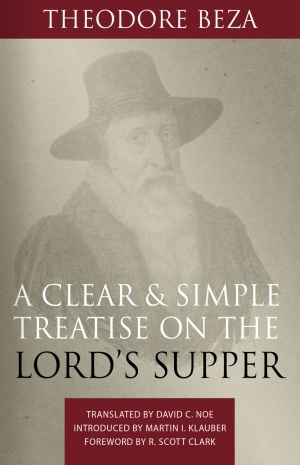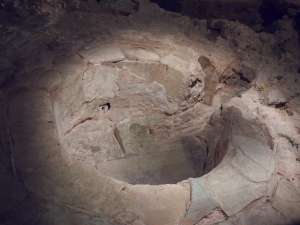Idelette was a young widow with two young children. Her former husband, Jean Stordeur, a cabinet maker from Liège (one of “those cities of the Netherlands in which the awakening had been most remarkable,” J.H. Merle D’Aubigne writes), contracted the plague in . . . Continue reading →
Author Archives: R. Scott Clark
PCA Standing Judicial Committee Receives Complaint Regard Greg Johnson
The Standing Judicial Commission (SJC) of the PCA has received a Complaint from a Teaching Elder in Missouri Presbytery against the action of Missouri Presbytery that approved a recommendation of its Investigation Committee not to pursue judicial process against TE Greg Johnson. . . . Continue reading →
Why Did God Put A Crook In The Lot?
But in Thomas Boston’s usage the crook is the crooked, that is the uncomfortable, discontenting aspects of a person’s life, the things that the Puritans called losses and crosses, and that we speak of as the stones in our shoe, the thorns . . . Continue reading →
A Message To Millennials (And Zoomers) About Marriage
Millennials seem to have given up on marriage. In their defense, a Millennial might argue, “We’re just being consistent. The Boomers showed us that marriage is a joke. They gave us “no-fault” divorce, the Gen-Xers were a half-way house and we’re consistent. . . . Continue reading →
Now On Sale For $10.00: Beza On The Lord’s Supper
Office Hours: Carl Trueman Explains Why The World Seems So Upside Down
Or Why It Seems Rude To Call Caitlyn, Bruce And Elliot, Ellen
If you are of sufficient age, you remember when Caitlyn Jenner was Bruce Jenner, one of the greatest Olympic Athletes in modern history. He won the gold medal in the Decathlon in the 1976 Olympics. If you are a little younger you . . . Continue reading →
What Must You Know To Live And Die Blessedly?
2. How many things are necessary for you to know, that in this comfort you may live and die blessedly?
How Not To Respond To Antinomianism Or Nomism
The Antinomian denies the abiding validity of God’s moral law. Continue reading
Is The Church Only A Hospital Or Also An Embassy?
In our time, however, the tendency is to view the church as means of therapy, merely as a place of fellowship and encouragement, but not as the divinely instituted embassy in which the keys of the Kingdom of God are administered. Viewed . . . Continue reading →
Chris Gordon: Did Therapeutic, Moralistic Deism Give Us A “Woke Church”?
The joining of the church and the world in America has been years in the making. The American churchgoer was trained to view the church as having the sole purpose of making people happy, commonly labeled as moralistic therapeutic deism. Whatever struggle . . . Continue reading →
The So-Called “Celestial Flesh” Christology Is Just Gnosticism
But, according to [the Gnostics], neither was the Word made flesh, nor Christ, nor the Saviour (Soter), who was produced from [the joint contributions of] all [the Æons]. For they will have it, that the Word and Christ never came into this . . . Continue reading →
Why Does It Take So Long To Explain Infant Baptism?
Yesterday someone commented on one of the BigSocialMedia platforms that the Heidelcast series, “I Will Be A God To You And To Your Children” helped them to understand and accept infant baptism (paedobaptism) as the biblical position. Someone else objected, in effect, . . . Continue reading →
Religious Freedom Watch: Federal District Court Upholds Religious Liberty For Physicians Against Obamacare Rule
In these consolidated cases, a coalition of entities affiliated with the Catholic Church and the State of North Dakota challenge the implementation of Section 1557 of the Patient Protection and Affordable Care Act (“ACA”), a statute that prohibits certain forms of discrimination . . . Continue reading →
Interested In A URCNA Church Plant In The Eastern USA?
Contact info. NB: A Classis is a regional assembly of Reformed churches. It is a Latin word that originally referred to a fleet of ships. The Presbyterians say essentially the same thing with the word Presbytery Resources How To Subscribe To Heidelmedia . . . Continue reading →
Bavinck: Grace Does Not Destroy Nature
Regeneration does not erase individuality, personality or character, Continue reading →
Why Do Confessional Presbyterian Churches Use Images Of Christ?
The Westminster Larger Catechism (a constitutional doctrinal standard of the PCA) in answer to question 109 says sins forbidden by the Second Commandment include “making any representation of God, of all or of any of the three persons, either inwardly in our . . . Continue reading →
Thinking Of Planting A Confessional Reformed Church On The Plains?
It is not easy to plant a confessional Reformed congregation on the American Plains (the area of the USA from the between the Rockies and the Mississippi River, from Canada to Mexico). In some places it is sparsely populated. The confessional Presbyterian . . . Continue reading →
Owen Gives Us Theological Reasons To Object To Intinction
2. The special object of faith, as justifying, is not the special object of faith in this ordinance. The special object of faith, as justifying, is the promise, and Christ in the promise, in general, as “the Saviour of sinners:” so when . . . Continue reading →
Herman Witsius Contra Intinction
XXV. Next follow the actions of the disciples, and consequently of the other guests. And these, according to Christ’s appointment, are three: first, to receive both the bread and the cup; but each separately, for so Christ distributed them: in this manner . . . Continue reading →
Network Stations Stand By
Heidelcast episode 172 is coming later today, Dv.




